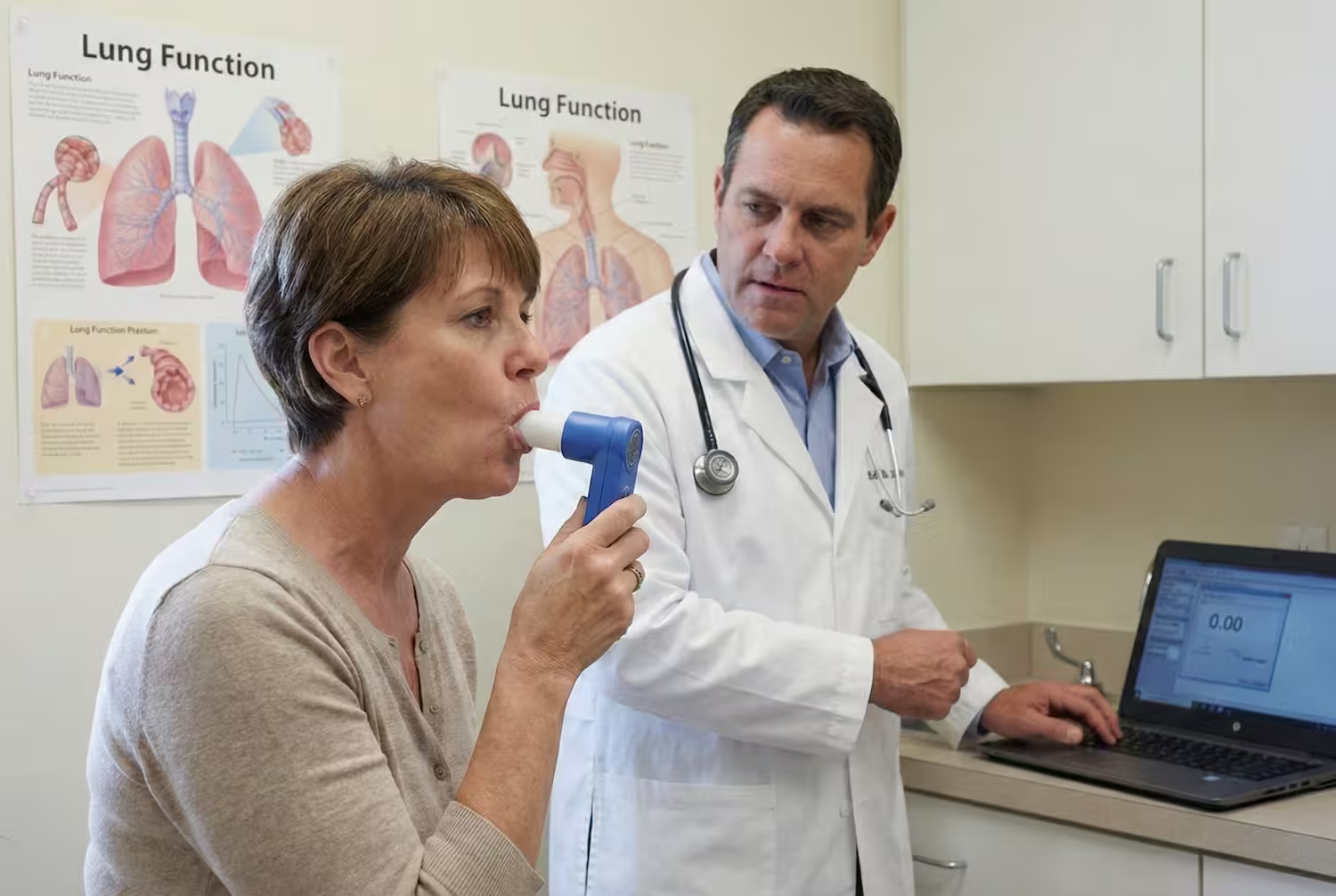
Ensuring the accuracy of a pulmonary function test (PFT) is pivotal for assessing respiratory health. While the test itself is comprehensive, its results can be influenced by various external factors.
From the foods and drinks you consume to the activities you undertake just hours before the test, every detail matters. Being adequately informed about the dos and don'ts before a PFT can mean the difference between an accurate diagnosis and a misleading one. In this guide, we'll walk you through the essential preparations to help you achieve reliable PFT results.
What Is a Pulmonary Function Test?
A pulmonary function test (PFT) is a comprehensive evaluation that measures the lungs' ability to take in and exhale air effectively. This test gauges how well oxygen circulates into the bloodstream.
Proper preparation for a PFT is key, as it ensures the results are both accurate and consistent. Inaccurate results can lead to misdiagnosis and ineffective treatments. Being aware of what to avoid prior to the test is essential, and with appropriate preparation, patients and healthcare providers can work hand-in-hand for optimal respiratory health.
Should You Avoid Certain Foods and Drinks Before a PFT?
Yes, certain foods and beverages can influence the outcomes of a PFT. For instance, caffeine can cause bronchodilation, which might skew the results. As such, patients are often advised to abstain from coffee, tea, and certain sodas before the test.
Similarly, consuming heavy meals can restrict the diaphragm and lung expansion. It's generally best to eat a light meal a few hours before the test to prevent this. Alcohol can also affect lung function and is best avoided the night before. By steering clear of these, patients can ensure they're giving their PFT the best chance at yielding true-to-form results.
Can You Take Medications Before a PFT?
Pulmonary function tests (PFTs) offer invaluable insights into your respiratory health, but certain medications can influence the results. It's vital to ensure that your test outcomes are as accurate as possible to guide subsequent treatments or interventions.
Bronchodilators, commonly used by individuals with asthma or COPD, are one such group of medications. They work by opening up the airways, which can significantly impact the results of a PFT. If you use an inhaler or take oral bronchodilators, you might be asked to refrain from using them for a period leading up to the test.
In addition to bronchodilators, other medications might also have an effect. Some anti-inflammatory drugs, certain types of heart medications, and even some cold remedies can potentially influence PFT results.
Given the range of medications that can interact with the test, it's crucial to maintain an open dialogue with your healthcare provider. Ideally, you should provide them with a complete list of your medications, both prescription and over-the-counter. Based on this, they can advise you on any necessary adjustments to your medication schedule leading up to the test.
How Can Physical Activity Affect a PFT?
Physical activity plays an essential role in maintaining our overall health. However, when gearing up for a pulmonary function test, the nature and timing of your activities can influence the results.
Engaging in strenuous activities shortly before the test can temporarily change your lung function, potentially skewing the results. Intense exercise can lead to rapid and deep breathing, altering the standard values that the PFT aims to measure. It's generally advised to avoid vigorous exercises for at least a couple of hours before the test.
Additionally, the kind of activity matters too. For instance, swimming or activities in cold air might affect your airways differently than a brisk walk or a gym workout. It's essential to consider the environment and intensity of your exercises before the PFT.
While it's recommended to rest and avoid strenuous activities, it doesn't mean you should be completely sedentary. You can engage in light activities, like walking.
The key is to strike a balance and ensure your lungs are in their most natural state during the test, neither overly fatigued nor unusually stimulated. Remember, the goal of the PFT is to measure your lung's standard function, and preparing appropriately is crucial for accurate results.
What Should You Avoid Wearing to a PFT?
The clothes you wear can surprisingly have a significant impact on the outcome of a PFT. When preparing for this test, comfort is key, but it's also essential to ensure nothing restricts your breathing.
Tight clothing, especially around the chest and waist area, can be restrictive. Tight belts, corsets, or form-fitting dresses might limit the full expansion of your lungs, which can, in turn, affect the test results. Instead, opt for loose-fitting garments that allow you to breathe deeply without any hindrance.
Furthermore, avoid wearing neck accessories like thick scarves or high-necked shirts, as they could potentially interfere with equipment placement or constrict your neck. Remember, during a PFT, you'll be required to take deep breaths, and any clothing that might interfere with this action should be avoided.
You should also consider avoiding heavy jewelry or accessories that might dangle or interfere with the equipment. For instance, long necklaces or large earrings might get in the way.
How Does Your Mental State Affect PFT Results?
Your mental state, particularly stress and anxiety, can indeed influence the outcome of your pulmonary function test. Stress triggers the body's "fight or flight" response, releasing hormones that can cause rapid breathing or shortness of breath, potentially skewing PFT results.
Also, anxiety can lead to hyperventilation — a condition where you breathe more deeply or rapidly than usual. This altered breathing pattern can affect the measurements taken during the test. It's important to approach the test with a calm and relaxed mindset.
Some people may feel claustrophobic or anxious about the mouthpiece or nose clip used in the test. If you're prone to anxiety or claustrophobia, communicate this to your healthcare provider. They can offer guidance, reassurance, and alternatives to ensure you're comfortable.
To optimize your mental state, consider techniques like deep breathing exercises or meditation before the test. Familiarizing yourself with the procedure, understanding what to expect, and asking questions beforehand can also alleviate concerns and ensure a smoother testing experience.
Remember, the PFT is a diagnostic tool, and its accuracy is highly important. Being in a relaxed state, both mentally and physically, ensures that your results genuinely reflect your lung function without external influences.

How Can Carda Health Help You Prepare for a PFT?
Carda Health is at the forefront of virtual rehabilitation and patient education, ensuring individuals are well-prepared for diagnostic procedures like the pulmonary function test. Our approach combines technology with a patient-centric philosophy.
Whether it's offering guidance on pre-test preparations or addressing concerns about the procedure, our platform is here to provide you with the information you need to confidently engage with your healthcare team.
The Bottom Line
A pulmonary function test is vital for diagnosing and monitoring respiratory conditions. Proper preparation, be it in clothing, mindset, or understanding medications, ensures accurate results.
With the support of platforms like Carda Health, patients can navigate the PFT process with confidence and clarity, ensuring they receive the most comprehensive care and understanding of their lung health. Remember, by being well-informed and adhering to the guidelines, you significantly enhance the test's efficacy and gain a clearer picture of your respiratory well-being.
Sources:
COPD - Symptoms and causes | Mayo Clinic
Claustrophobia: What Is It, Symptoms, Causes & Treatment | Cleveland Clinic
Vigorous Exercise Can Cause Abnormal Pulmonary Function in Healthy Adolescents | PMC

.avif)






